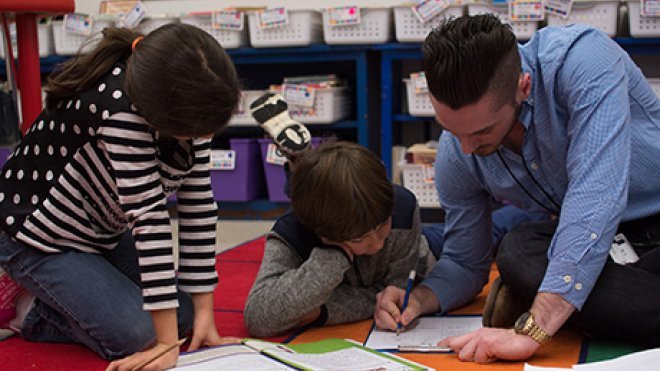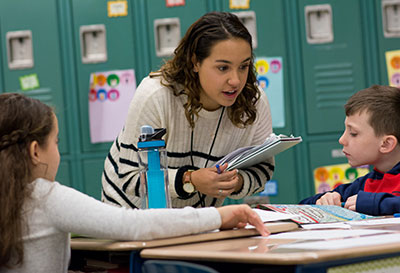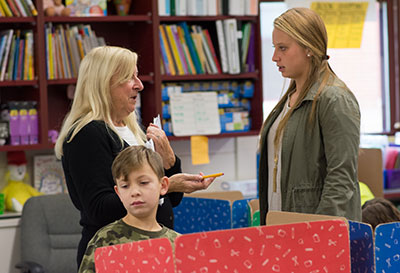RWU’s Department of Education Launches Elementary Teacher Residency
Model places students in classroom for entire year in effort to increase faculty supervised school-based experience for university’s teacher candidates

BRISTOL, R.I. – In RWU’s Department of Education there is a simple philosophy: The best place to teach a student how to be a teacher is inside a K-12 classroom. So while most universities don't offer extensive faculty supervised school-based experiences until their senior year, RWU's new residency model has students receiving this as early as sophomore year. It's an experience that helps prepare RWU students for success as soon as they graduate.
The department does this by placing sophomore elementary majors at an elementary school for an entire year under the supervision of a host teacher and RWU education faculty member.
The effort is part of the department’s strategy to increase the amount of time its teachers-in-training spend in K-12 classrooms. The increased school time helps expose RWU students to skills they can only master by being inside a K-12 classroom – such as classroom management, which is among the hardest skills for new teachers to learn.
The model also allows RWU students to immediately apply or see what they learn in their university-based coursework in the K-12 classroom setting. And it provides a point of reference that enhances the material being covered in their textbooks.
“There are so many dynamics that are going on in a K-12 classroom, you can’t really break it down in a university classroom,” said Rachel McCormack, professor of literacy education and director of the elementary education program. “You have to see it.”
During RWU's residency year, students are broken into cohort groups and then assigned to a single school and classroom for the fall and spring semesters, where they are supervised by RWU education faculty members.

RWU students observe their host teacher, plan and work with small groups and learn to develop lesson plans for the fall semester. Gradually, they take on more responsibility during the year. In the spring semester, students will plan and lead entire lessons.
“By the time our students get to be seniors, they are going to feel so comfortable planning lessons, working with teachers, working with families and, most importantly, working with students,” McCormack said. “This is on-the-job training.”
Along with the in-school portion of the residency, RWU students spend one day a week taking their Teaching Methods courses, where they get to assess what they did or saw in their schools with RWU faculty members.

Faculty members are also in schools with the students and offer on-the-spot feedback to the RWU students. The feedback reinforces what the RWU students are doing right and what can be improved in their teaching.
RWU's residency model also encompasses an online portion. In it, students are asked by the faculty member supervising them to read articles, participate in forums, answer prompts or check-in.
This year, there are about 50 sophomores participating in the elementary teacher residency model. They have been split into three cohorts and placed in three community elementary schools: Hugh Cole Elementary School in Warren, Rockwell Elementary in Bristol, and William S. Greene Elementary School in Fall River, Massachusetts. Most students were assigned in pairs to a mentor teacher.
The model started as a pilot program last year at Rockwell Elementary. Currently, RWU's Education Department is working on expanding the model for secondary education majors. A driving reason behind that is that students are already seeing the model as vital to their experience.
Abigail Higgins, for example, who is spending her residency year at Rockwell Elementary, said she’s been learning strategies in this model that she wouldn’t have learned at this point in her training just through standard university-based coursework.
“Our professors and the book can teach us so much about different scenarios or situations that may occur, but at the end of the day we won’t have that experience if we don’t see it first hand,” Higgins said. “I feel like we have a deeper understanding of the topics we’re learning because we get to watch them be applied.”